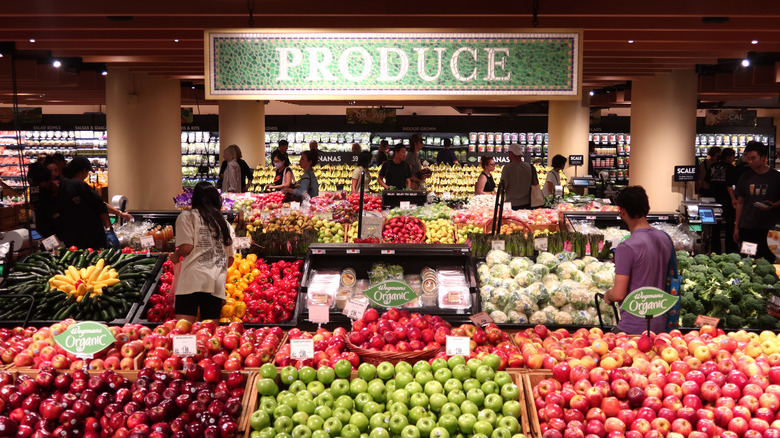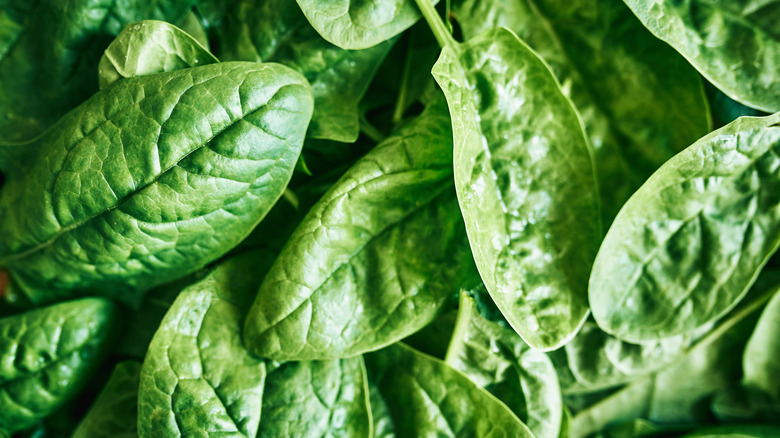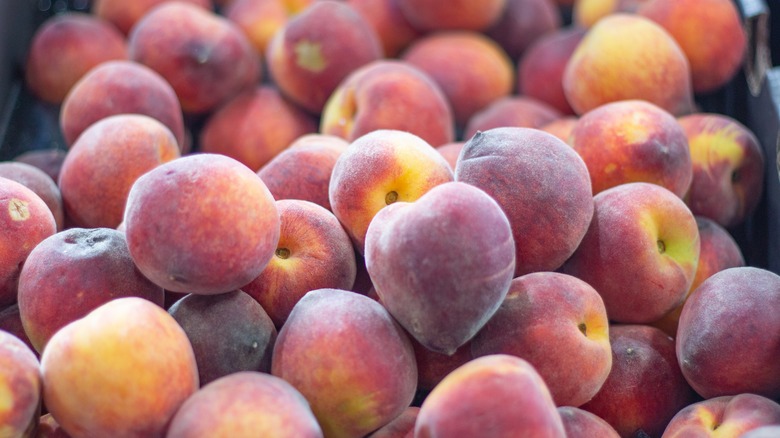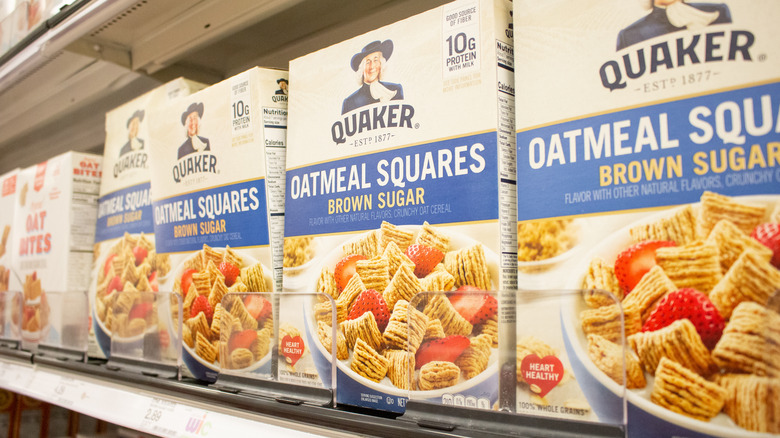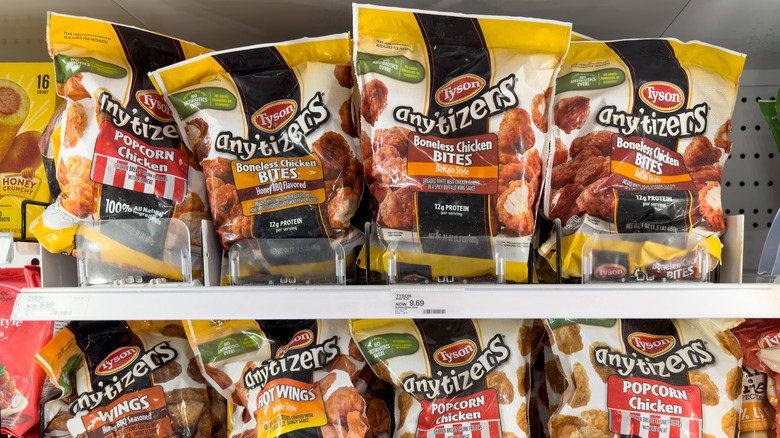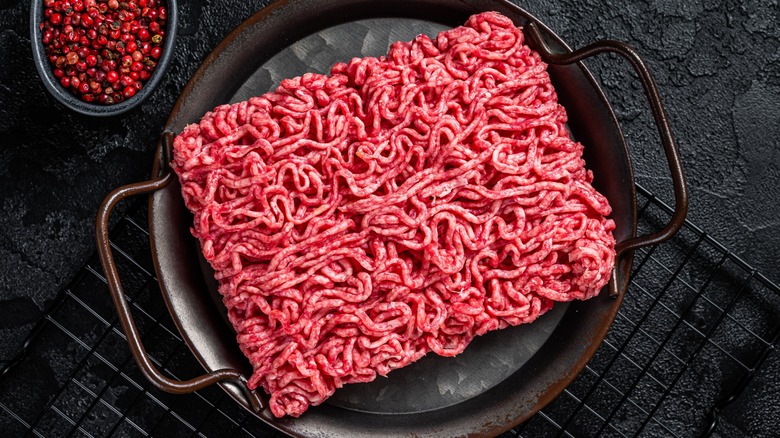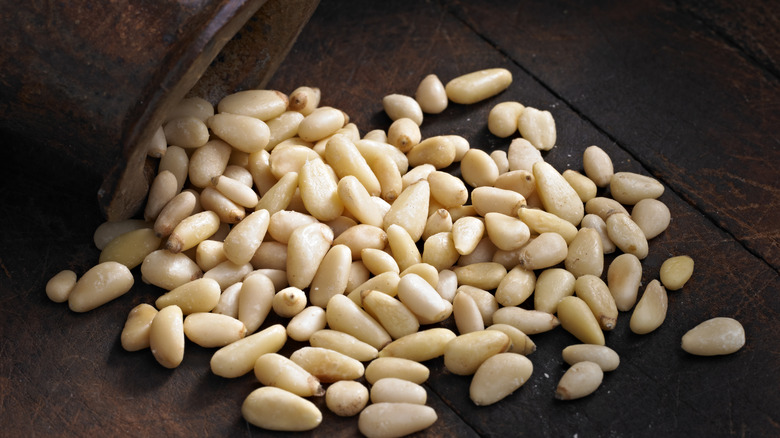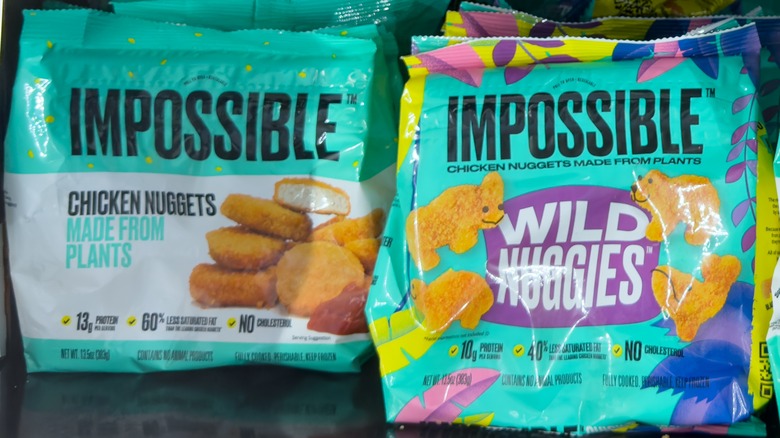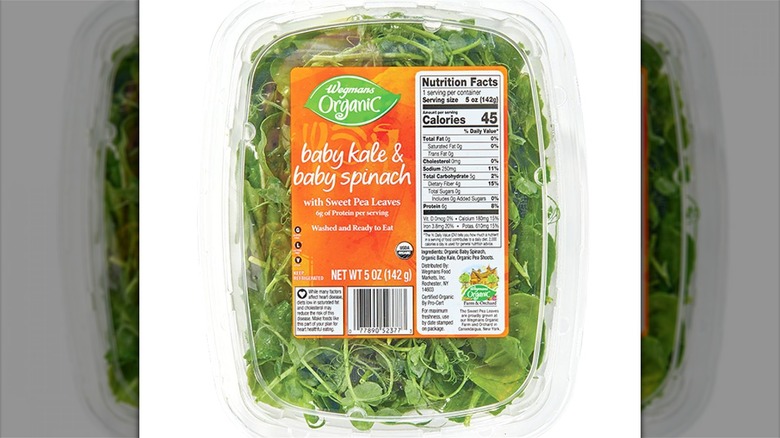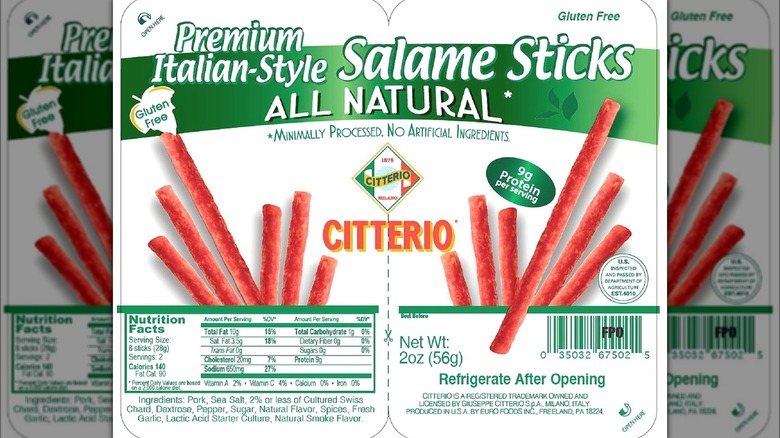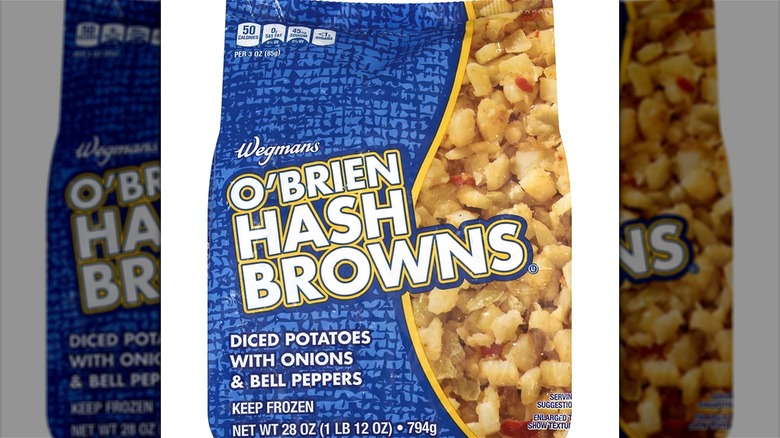The Biggest Food Recalls In Wegmans' History
Whether it's tracking the best bargains or scouring nutrition labels for questionable additives, consumers are trained to develop an eagle-eyed awareness when venturing to their trusted grocery stores. Food recalls, unfortunately, have become an inevitable part of the experience.
Wegmans might not seem like a place that could provoke listeria hysteria or hawk mislabeled cereal boxes. The grocery chain is prized for its reticent approach to business growth, and amenities like fresh produce and artisanal provisions assign it a glossier reputation compared to the walk-in, walk-out utility of a Walmart warehouse. That being said, Wegmans has seen its share of mass-contaminating events, and we've rounded up some of the biggest cases that have occurred during the company's 108-year-old history. Without further ado, let's walk through the foodborne illnesses, nasty allergens, and inedible materials emerging from the store's own products — and by the name brands familiar to everyone.
Chicken
Wegmans removed four varieties of raw chicken from its shelves in 2016. According to a press release by the USDA, the grocery retailer processed the poultry without the government agency conducting a safety inspection beforehand, then shipping the pre-seasoned meat without approval to stores in Virginia, Maryland, Massachusetts, New York, Pennsylvania, and Maryland. The offerings slashed from mass availability were single-pound portions of Wegmans Italian Flavored Chicken Breast Cutlet, Brown Sugar Barbecue Seasoned Chicken Breast Cutlet, Wokery Sherry Chicken, and a 3-pound portion of Garlic & Fennel Whole Chicken Roaster, each one dated between January 13, 2016 through January 24, 2016.
What went wrong here? Basically, the company broke protocol. It didn't commit to manufacturing the meat during the allotted hours it had agreed to, which meant the Food & Safety Inspection Service wasn't able to assess that the meat was safe to eat. This is seriously risky. What if a customer came down with listeria, or broke out into hives from an undisclosed ingredient? The department stated the recall constituted a Class I matter — in plain speak, this is where the risk of fatalities is at its highest — and this lead to over 1,000 pounds of meat being disposed of. Shoppers were instructed to return the chicken to any store, a move that likely explains why no illnesses were documented in coverage on the situation.
Organic spinach
Unfortunately (or not, for those who despise vegetables) Wegmans loyalists would have been warned off of some of the leafy blends in 2012. A staggering 31,000 pounds of raw spinach were tossed by the chain after it was found the veggies were tainted by E. Coli. Though initial cases of exposure emerged out of New York, the bacteria sprang up in five additional states before riding off with 33 illnesses by the end of the outbreak. Patrons were notified to look out for the Food You Feel Good About Organic Spinach & Spring Mixes, packaged in 5-ounce and 11-ounce containers labeled anytime between October 14 and November 1st of the year.
The strain of E. Coli Wegmans detected was O157:H7; essentially, whenever there's a public health panic involving soiled food, this is the variant you're most likely to encounter. Many will find themselves out of the woods after about a week of symptoms — namely side effects like dehydration and gastrointestinal distress — yet per Mayo Clinic the danger of complications goes way up for young ones and the elderly. Of the customers who ate the tainted vegetables, about a dozen recovered in the hospital to give you a sense of how risky the sickness can be.
Peaches
Peach lovers would have hopefully avoided Wegmans during August 2020, since a widespread salmonella epidemic related to bulk and bagged peaches broke out in 17 states. Prima Wawona, a produce supplier from the West Coast, dispatched the soiled fruit to the retail chain, as well as Aldi, Walmart, Target, and Kroger supermarkets where they were dispensed under an array of different private labels. Two-pound bags of peaches, along with bulk pieces available for self-serve picking, constituted the core focus of the recall, but the rollback targeted a selection of desserts since Wegmans' bakery utilizes the fresh fruit in many of its recipes.
By eating the problematic peaches, you could be gambling on your very well-being; salmonella can trigger very unpleasant symptoms like fever, vomiting, bloody stool, nausea, and more. Those with pre-existing conditions have a higher chance of risking death. As far as we know, there were not any fatalities resulting from the ruined fruits. And to its credit, Wegmans handled the crisis well (namely, welcoming returns and tracking down patrons via phone). Findings from the FDA illustrated at least 100 people falling ill from the pathogen, close to 30 of whom got sick enough to seek out hospital intervention.
Quaker products
The specter of salmonella is a frightening one, and Quaker Oats Company's endured an ongoing frenzy since the end of 2023. The illness, linked to a manufacturing center in Danville, Illinois, potentially tarnished dozens of products including granola bars, cereals, and various snack offerings sold in retailers across the country. A formal recall was announced on December 15, 2023, but the company issued a follow-up on January 12, 2024 to account for additional items the bacteria might have contaminated. Overall, for everyone's protection, around 60 products have been pulled from shelves.
Where does Wegmans relate to one of the largest-scale food recalls in recent memory? The grocery outlet, as it turns out, was implicated in the second round of cuts to the brand's lineup, taking action on January 11, 2024 by getting rid of Quaker Oatmeal Squares cereal. What's troubling about salmonella is that when it comes to food, there'll be no outward signs anything funky is afoot. This makes swift action necessary to prevent mass illness, if not casualties.
As we speak, the bacterial infection hasn't led to any hospitalizations or deaths. Still, it's likely shoppers have heeded the warning and ventured to their nearest Wegmans to seek a full refund on their Chewy bars, rather than eating them.
Dark chocolate
First Source, one of Wegmans' numerous distributors, instigated a massive recall in October 2017 that extended to 23 states and loads of major supermarkets. Shoppers patronizing Tops, Giant, Stop N Shop, and others were told to dispose of dark chocolate, both pre-packaged and from the self-serve department. The inciting reason? Labeling, as the company neglected to advertise that milk was one of the ingredients featured in the array of chocolate-coated nuts, fruits, and coffee beans.
For pre-packaged snacks, customers were advised to toss out any qualifying items regardless of the date on the bag. Meanwhile, for bulk wares, only items manufactured between January 1, 2016 and October 30, 2017 had to be chucked out. Half of the bagged goods gathered in the recall were exclusive to Wegmans.
Seeing as milk is one of the FDA's major allergens, not clarifying that fact could harm shoppers who are sensitive to dairy. It takes little exposure to unleash a physical response. That no health issues arose and First Source halted the snacks from hitting shelves anyway is a reminder that allergens need to be dealt with, and treated, seriously.
Birds Eye Foods Frozen Winter Squash
Researching the fancy supermarket's past will dig up some older instances of botched inventory. Birds Eye Foods, which is a popular label sold at Wegmans, took its Frozen Winter Squash out of circulation back in 2006. Anyone paying attention to food recalls would probably guess germ-riddled produce first, but in actuality, the offending organism was of a different, though no less toxic breed: ammonia. Upon word from concerned consumers, health officials managed to trace the harmful chemical back to batches originating from the supplier (this was Chase Farms, a Michigan-based agribusiness), prompting Birds Eye Foods to halt production on the vegetables immediately. The packets that were believed to be compromised weighed 12-ounces and featured the codes 5CF, 5JE, and 6JE stamped on the bags.
Since ammonia is notoriously harsh-smelling, customers presumably caught on to the terrible odor right away before they could do any cooking. Regardless, the chance an unaware grocery shopper used it in their sheet pan dinner needed to be squashed, given that the compound is known to unleash terrible symptoms from stomach cramps and nausea to the loss of eyesight. At the end of the day, the toxin plagued 3 million baggies on the market.
Tyson chicken products
Supermarket chains coast to coast have been battered by the Tyson Foods listeria outbreak of 2021, which has seen close to 9 million pounds of poultry offerings scrapped and three infections from the contagion, for which one person has died. Wegmans joined the chorus of recall announcements that July cautioning consumers against a handful of the bagged products that happened to be sold on the premises. The upscale grocer instructed patrons that Fully Cooked Diced Chicken Breast and Fully Cooked Chicken Breast Strips bearing the codes UPC 0-23700-01627-0 and UPC 0-23700-01625-6 were dangerous to eat, and to get rid of whatever they had in their freezers.
The suspicion that listeria was to blame was confirmed following health experts attaining a positive test result in a handful of the brand's products. Supermarkets have been hardest struck by the sullied chicken, yet other venues where dining rooms are present — retirement homes, school cafeterias and the like — have had to clean out their stock to prevent the strain from further spreading. By virtue of Tyson's ubiquity in the grocery sphere, it's safe to say it's one for Wegmans' books.
Ground beef
The "E-word" strikes again, this time related to ground beef. Wegmans was thrown into yet another gigantic E. Coli outbreak in 2007, after discovering one of its processing plants churned out bacteria-riddled meat. Cargill Meat Solutions Corp. sounded the alarm to consumers, publicly removing the tainted allotment from the line while urging shoppers to dispose of the meat in any way possible. In Wegmans' circumstances, as a round-up outlined, the impacted items included the following: 80, 90, and 95% Lean Fresh Ground Beef, Lean Fresh Ground Beef Patties, and pre-assembled dishes intended for cooking at home (such as raw meatballs, stuffed peppers, and meatloaf).
Typically, Wegmans has issued memos on the recalls entering its doors, but that just wasn't the case here. The meat in question (dated between October 10 and 29) was sold prior to the meat processor announcing its decision in November, so it was especially crucial shoppers double-checked their kitchen stash. What was the grand total Cargill racked up in this debacle? About a million pounds of ground beef, and the pattern of contaminated meat appears to have continued for the company well into 2024.
Turkish pine nuts
If you like munching a variety of snacks, buying in bulk can help you build your grab-and-go stash. Unfortunately for those on the East Coast around 2011, hitting up the bins could have put you front-and-center to foodborne illness. Wegmans Turkish Pine Nuts — 5,000 pounds of them to be exact — were scrubbed from supermarkets in five states following confirmation from the nut's source (Sunrise Commodities, a New Jersey processing plant) that the nuts were tainted by salmonella. In fact, it took the CDC to get the ball rolling in removing them from stores, on account of so many of the illnesses overlapping.
In general, pre-packaged bags stashed on shelves were okay; what the recall designated as the concern were loose nuts from the bulk section dispensed from July 1 to October 18, 2011. And true to how Wegmans has handed recalls before, the company ensured that shoppers who purchased the red-alert products were informed by phone to discard them immediately.
Granted that the upscale market's encountered larger rollbacks before, this recall was entirely on the shoulders of Wegmans and Wegmans alone. There were 42 people who contracted the bacteria, plus two admitted to the emergency room.
Citrus fruits
A recall on various citrus fruits occurred at Wegmans locations during the summer of 2020. Listeria monocytogenes had wormed its way into stocks of Valencia Oranges and lemons, and in August, the chain put out a warning for patrons who'd bought the fruits to get their money back. To no surprise, the culprit behind the contamination ended up being one of the retailer's suppliers, Freshouse Produce LLC, who motioned to get these fruits on the chopping block, and out of shoppers' grasps.
Wegmans' safety measures zeroed in on fruits purchased during a brief, but specific time frame (from July 31 to August 7, respectively). The affected varieties were packed in 2-pound and 4-pound pouches, and included any loose lemons out on the floor for self-bagging. While these were the focus of the recall, the company broadened the removal effort to prepared foods, such as seafood entrées, too. This is because, like a lot of supermarkets, Wegmans assembles uncooked dishes out of the wares already on hand. How many hacks for cooking fresh fish instantly rely on zesty lemon wedges? Pitching them wholesale had to be done. Sure, the situation didn't spark an all-hands disaster, but that's still not excusable for the potential risk customers could burden.
Impossible Nuggets
On St. Patrick's Day 2023, Wegmans flagged two kinds of Impossible-brand frozen nuggets for containing inedible materials. Impossible moved first in halting distribution when an inspection disclosed chunks of wood burrowed into inventory churned out from October 20 to November 23, 2022, sending supermarkets into overdrive to scrap the affected lots. Wegmans followed suit, telling its shoppers to search their freezers for both Impossible Chicken Nuggets and Impossible Wild Nuggies in 13.5-ounce packs. The dates signifying the marred batches ranged from January and February 2024, which the supermarket made sure to designate for guests to swap them out at the returns desk.
For a recall afflicting all 50 states, the impact was at least meager — as far as harm goes, for example, the intrusive objects didn't seem to cause any extreme injuries. But just to be safe, the company pushed ahead and proceeded in weeding out the 22 lots anyway. Let's face it: the chance of crunching down on wood is unpleasant enough to warrant advanced notice. And perhaps a new bag of untarnished plant-based nuggets for your trouble.
Three types of microgreens
Leafy salads for humans (and their pets) were at the center of a Wegmans-exclusive clean-out conducted at the tail end of 2022. As the FDA details, Organic Farm & Orchard Micro Greens, Organic Baby Kale & Baby Spinach with Sweet Pea Leaves, and Organic Farm & Orchard Cat Grass were eliminated from stores as a result of salmonella. Bio365, the farming operation behind the processing, affirmed that the strain was present in the dirt used to grow the produce, resulting in all three items exiting locations that could have the soiled containers available for purchase. The recall branched off into seven states, and was concentrated in the Mid-Atlantic and Northeastern regions of the U.S.
Fresh greens acting as vectors for active bacteria to spawn isn't too surprising; a study by the Science of The Total Environment Journal shows pathogens like salmonella respond well to fertile, earthy environments and are capable of sticking around for extensive periods of time — think 200+ days. By the time consumers buy it off the shelf, developing nausea or a fever is only a few hours away. We're grateful that besides some wasted money, guests got out unscathed.
Salami sticks
At the same time the Tyson Foods scandal was going on, Wegmans' shelves were handed another blow to food safety. Salmonella-tainted salami sticks from Citterio had shuffled into Trader Joe's locations (in America and Bermuda) during the fall of 2021, and Wegmans joined its company just days after plans were announced by the CDC to dispose of almost 120,000 pounds of the cured meat. Brick-and-mortars in New Jersey, New York, Pennsylvania, Virginia, and Massachusetts were entirely swept of the Euro Foods-produced snack, which essentially entailed any 2-ounce package distributed in late October, and labeled to be good until the upcoming year (dated no later than January 23, 2022).
How did it all go down? Following numerous illnesses coming to the CDC's attention, the potential link to Citerrio salami was cemented after the California Department of Health conducted sampling that unearthed the bacteria. In addition to Wegmans and TJ's, the salami was also present in mom-and-pop markets, such as wine shops and bakeries, and this resulted in a widely dispersed caseload. A total of 10 states weathered the epidemic and witnessed 34 illnesses come from the contamination. Young kids remained the primary group who got sick (and presumably factored into the seven patients who sought hospital entry).
Hash browns
In April 2017, a bizarre packaging blunder ensnared Harris Teeter and Roundy's by way of McCain Foods USA Inc. Various types of frozen hash browns the stores had received from the distributor were laced with crushed-up golf balls, sparking a swift callback by the company and FDA over concerns of choking. Because plenty of retailers share suppliers, it didn't take much time to link the processing faux-pas to spuds via Wegmans, wherein 28-ounce bags of the O'Brien Hash Browns were put on the chopping block. The states affected were Maryland, Massachusetts, Virginia, New York, New Jersey, and Pennsylvania. Guests were unequivocally urged to trash the item, and to get their dollars back should they prefer financial compensation from their store.
How did sporting goods material get mixed up in breakfast spuds? Given that McCain Foods didn't provide a concrete answer except to pledge participation in the ensuing scandal, it's still very mysterious. Two things about the story we do know: it took shoppers reporting the strange occurrence to kickstart the investigation, and nobody, thankfully, got hurt.
